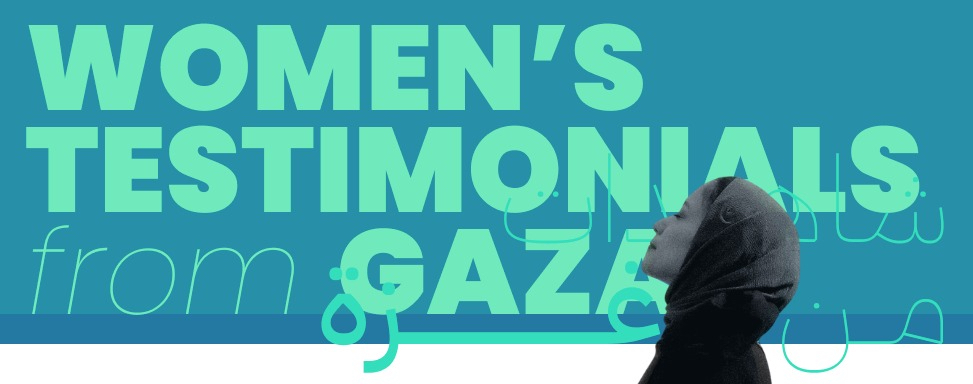Less than a month after the start of Israel’s settler colonial genocidal war in October 2023 and its targeted and intentional largescale destruction of life in Gaza, we began to collect and publish testimonials from Gazan women both inside and outside the Gaza Strip. Our work began in response to the overwhelming flood of testimonials and writings coming out of Gaza as the brutal Israeli aggression continued to escalate and Israel's attempts to eliminate the Palestinian people intensified, with active participation from US and European governments and their military-industrial complex. At first, our focus was on collecting testimonials shared on social media, due to their temporary lifespan and the threat of increased censorship of Palestinian content, and we also reached out to contacts we had in Gaza and asked if they were willing to share firsthand testimonials with us. We received our first testimonial from the north of Gaza from Baraa Hammoudeh who was to start her graduate study in October 2023 in the Institute of Women’s Studies' MA program for Gender and Development Studies and yet had been prevented from exiting Gaza due to the Israeli siege and bombardment of the Gaza Strip. A resident of the Beit Lahiya area, Baraa shared with us her harrowing experiences of war in words both haunting and defiant written on November 11 and 15, 2023. As we began to receive more firsthand accounts from other women of various backgrounds, ages, and occupations, sent through WhatsApp and Facebook as text or audio messages, the work took on new forms in response to what we were reading and through our interactions with many of the women. We shifted our focus from an act to collect and foreground their writings to an engagement with the life, language, and labor of the women producing them.
The women who shared their testimonials speak to the details of what this genocidal war is and its accumulation from the Nakba through years of siege and multiple bombing assaults – the impossible decisions they are forced to make between facing death in their homes or during displacement, the materialities of multiple displacements while pregnant, the army’s siege of hospitals and murder of those attempting to evacuate, searing critiques of those partaking in the destruction of Gaza and those silent about it, the degrading conditions of their survival, a compromised structure of humanitarianism that results in their inability to protect and feed their children; or in other cases, the constant panic and pain of being outside of Gaza far from one’s family inside, memorializing those who have been martyred, and documenting the unimaginable horrors that they have seen . . . Coming from different parts of Gaza and originally from ethnically cleansed villages in the 1948 Occupied Palestinian Territory, these women are medical workers, journalists, students, mothers, psychologists, artists, educators, writers – their words are not reducible to the effects of colonial-imperial violence they describe, as they reflect, conceptualize, critique, and defy the encompassing effects of this violence as such.
We focus on women from Gaza by foregrounding the specificities and differentials of Palestinian women’s life that is not a mere reflection of the violence being enacted upon them. We do not frame their words as carrying representational authority to ‘stand in’ for the women writing, or the experiences of all women, or to ahistorically transcend the limits of time. We are conscious that these women’s testimonials are written or recorded amid Israeli bombardments, forced displacements and separation of families, imposed starvation, and constant military invasions. We publish always with permission of the women and are careful to honor what is communicated with bare edits, whether formal or colloquial Arabic, text, or transcribed audio or video messages. We take responsibility for the translations, which have been supported by the labor of an extended network of individuals committed to this work.
We asked anti-imperialist feminist colleagues worldwide if they would like to communicate back to an individual woman in Gaza whose testimonial we published, and in February 2024, under the title “Letters to Gaza,” we began translating, publishing, and delivering their letters.
The women’s testimonials from Gaza have been published bi-lingually in Arabic and English on the Institute of Women’s Studies’ Facebook page since November 29, 2023. This phase of the work has come to an end in order to lead to a second phase of women’s testimonials from Gaza that will be announced soon. We want to acknowledge that the work of collecting, transcribing, translating, publishing, and all the design work around the testimonials has been voluntary. We are grateful to all the women from Gaza who shared with us their labors and parts of themselves through their words and images.
**Photograph in the graphic courtesy of Feda al-Hassanat, November 2023, Deir al-Balah. Feda writes: “The rain was visiting us for the first time in this war. Now the rain has betrayed us. Once, it had a touch of magic, taking my hand and turning me into a child again, dancing beneath the open sky. How could that same hand now make us tremble, uproot our tents, and leave our wounds so exposed?”
To read the testimonials:
Baraa Hammoudeh Part 1; Part 2; Part 3
Fatma Basheer on her friend, Mariam Hijazi
Soher Al-Halabi Part 1; Part 2
Sujood Abu Hassanein Part 1; Part 2
Mariam Mansour Al-Loh Part 1; Part 2
To read the letters:
To Soher Al-Halabi from Bernardita
To Shatha Qarmout from Suzan and Nadeen
To Khadija Al Helou from Tiana

